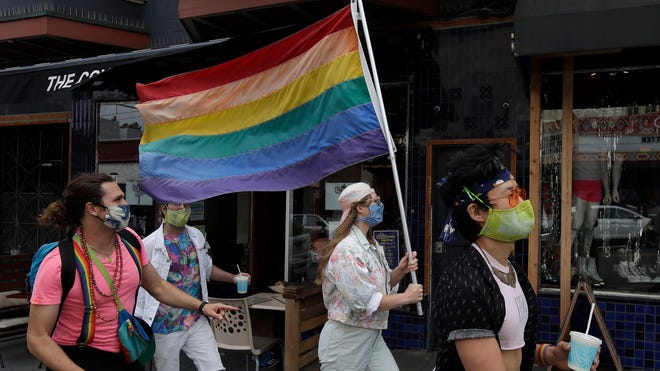

Ohio’s lesbian, gay, bisexual and transgender community is celebrating pride throughout June.
The month-long celebrations have their roots in the 1969 Stonewall Uprising in New York City. The protests lasted for six days and are considered the tipping point for gay rights in America.
We’ve come a long way, Sen. Nickie Antonio, a Lakewood Democrat and first openly gay Ohio legislator, said. But there is more work to be done.
“I think there is a patchwork of welcoming in the State of Ohio,” Antonio said. “There are certainly cities and communities across the state that have worked very hard to let people know they are welcoming.”
There are still places where gay Ohioans can legally lose their jobs because of their sexual orientation.
“What I really want is for everyone to know they are welcome in Ohio,” Sen. Michael Rulli, R-Salem, said. “I don’t think it’s more complicated than that.”
The two jointly sponsored the Ohio Fairness Act. The bill, which Antonio has kept introducing for the better part of a decade, would ban discrimination based on a person’s sexual orientation, gender identity or expression.
It’s backed by business groups like the Ohio Chamber of Commerce, but it’s not the only bill impacting the LGBTQ community.
Here is a list of LGBTQ bills in Ohio’s legislature and where they stand.
Cultural competency training
Senate Bill 48 would require certain healthcare professionals (dentists, nurses, pharmacists, physicians, social workers) to receive cultural competency training in order to get or renew their licenses.
Supporters say this kind of training improves patient outcomes because people feel more comfortable when their doctors understand different cultural values, customs and traditions.
The bill was introduced in February but has yet to have a hearing.
Conscience clause
Republicans inserted a last minute amendment into the state budget that would let health care providers decline to provide any service “that violates the practitioner’s, institution’s, or payer’s conscience as informed by the moral, ethical, or religious beliefs or principles held by the practitioner, institution, or payer.”
LGBTQ advocates fear this language would give doctors legal cover to discriminate against members of their community.
Supporters say that’s not true. Doctors or nurses could say no to a specific treatment. It wouldn’t let them deny overall care to patients.
Banning conversion therapy
Senate Bill 50 would ban conversion therapy for minors, a controversial form of therapy that aims to change a person’s sexual orientation or gender identity.
The American Psychological Association has opposed conversion therapy since 1998, saying it “does not believe that same-sex orientation should or needs to be changed, and efforts to do so represent a significant risk of harm.”
Columbus, Dayton, Cincinnati and Toledo have all banned this kind of therapy but the state has not. The bill was also introduced in February but has yet to have a hearing.
Ohio Fairness Act
A pair of bipartisan bills – Senate Bill 119 and House Bill 208 – were introduced in March . The bills would add sexual orientation and gender identity into Ohio’s existing anti-discrimination law.
“It’s a solid bill. It’s protecting your right to get a job,” Rulli said. “Sen. Antonio was very cautious. A lot of the controversial topics are not in this bill,”
For example, the bills include exemptions for religious organizations. Opponents like Sen. Matt Huffman, R-Lima, argue that it creates “another set of parameters for lawsuits that, of course, inevitably falls on the backs of small employers.”
Transgender athletes
Senate Bill 132 and House Bill 61 would ban transgender girls from playing on female sports teams in Ohio.
Both Rep. Jena Powell, R-Arcanum, and Sen. Kristina Roegner, R-Hudson, say transgender girls have unfair advantages when it comes to sports. And their bills are meant to protect “the integrity of women’s sports.”
The Ohio High School Athletic Association’s policy on transgender student athletes mirrors the NCAA rules for college sports. Transgender girls can compete after a year of hormone therapy.
Opponents say throwing these kids off their sports teams will harm their mental health.
“We’re not talking about elite athletes here,” Rep. Mary Lightbody, D-Westerville, said. “These are children who want to play on a team with their friends.”
The Senate bill hasn’t had a hearing, but the House held its first hearing in April.
Antonio doesn’t think either bill will become law though.
“I believe that bill is more to communicate with a base group of people to instill fear where there should not be any,” she said.
Bias-motivated crimes
Senate Bill 149 would revise Ohio’s hate crime laws from the revised code calls “ethnic intimidation” into “bias-motivated crimes” that include a person’s gender, sexual orientation or gender identity.
The bill has yet to have a hearing.
Anna Staver is a reporter for the USA TODAY Network Ohio Bureau, which serves the Akron Beacon Journal, Cincinnati Enquirer, Columbus Dispatch and 18 other affiliated news organizations across Ohio.